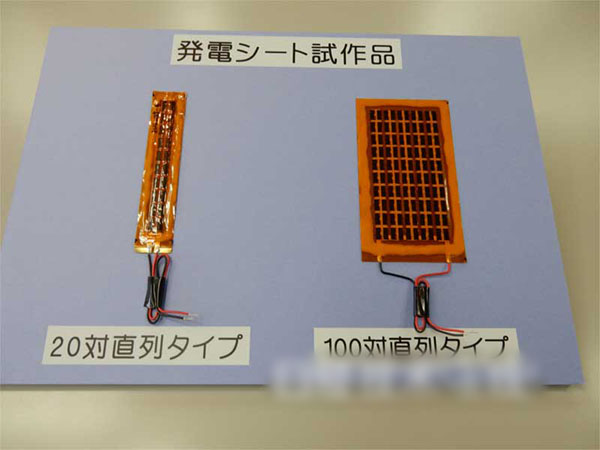It can cling to the chimney. Sekisui Chemical Industry will conduct empirical experiments on thermoelectric power generation sheets using such thermoelectric conversion materials. This thermoelectric conversion material was jointly developed by Sekisui Chemical Industry and the National Institute of Science and Technology (NAIST) in Nara, Japan. Based on carbon nanotubes (CNTs), it is flexible compared to conventional materials and has high environmental affinity. The main purpose envisaged is to use it on heat sources such as air conditioning piping.
Thermoelectric conversion utilizes the Seebeck effect of applying a temperature difference to a semiconductor to generate a voltage. CNTs are generally p-type semiconductors and are difficult to convert into n-types by simple methods. The new technology can use sodium chloride (NaCl) and crown ethers to build sodium ions on CNTs to produce stable n-type semiconductors. Conventional toxicizers have been used in power plants that use fossil-type helium-based thermoelectric materials. They are difficult to dispose of, and they cannot be bent and have a large weight. Therefore, they are used only in limited facilities such as factories. The CNT thermoelectric material solves these problems and can be introduced at various locations as long as there is a heat source capable of ensuring a temperature difference of about 40°C.

Thermoelectric power generation sheet prototypes. Each black grid area has a pair of p-type and n-type electrodes.
The trial product is a sheet-like sheet material made of non-woven CNTs arranged on a substrate. The maximum power generation amount is 475 μW. With flexibility, it can be rolled up to a tube with a diameter of 5 cm. In the future, the thickness will be further reduced to enable it to be attached to a complex surface with a three-dimensional shape.
Its main use is expected to be sensor nodes using energy harvesting technology. Specific applications include transportation networks, dams and other infrastructure, as well as job sites such as farms and other primary industries. In addition, current sensors are mostly driven by dry batteries. Therefore, it is expected that there will be a large number of replacement needs in locations where it is difficult for people to access. Sekisui Chemical Co., Ltd. stated that "the goal is to use the same area and cost as dry batteries to achieve equal or above-level performance." The company plans to introduce products in the year of 2018, and plans to start looking for partners in various stages of product design. (Reporter: Uchiyama Yuki)
Solar Lights,Outdoor Solar Light Strip,Strips Solar Light,Led Solar Light
Shenzhen Huangtai Photoelectric Co.,Ltd. , https://www.huangtailed.com
